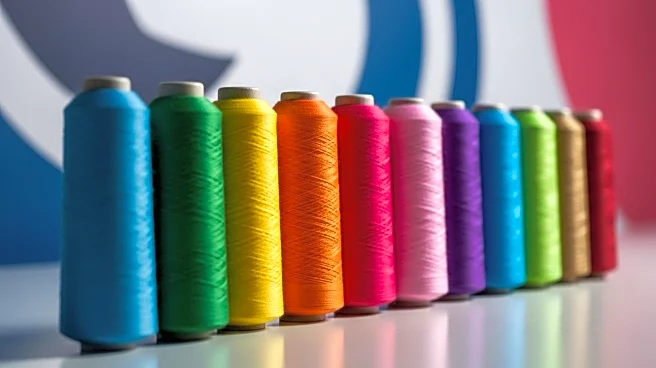What's Happening?
The global textile industry has reached record levels of production, significantly contributing to the fashion and footwear sectors' carbon emissions. According to a report by the non-profit Textile Exchange, the production of plastic-based polyester has been a major factor in this increase. Over the past five years, greenhouse gas emissions from raw material production in these sectors have risen by over 20%. In 2024, total material production hit a record 132 million tonnes, with polyester accounting for 43% of emissions from fiber production. The rise of ultra-fast-fashion companies like Shein and Temu has further driven the production of cheap, synthetic fashions, exacerbating the environmental impact. Despite efforts by fashion brands to use more recycled polyester, the growth of virgin polyester production has outpaced these efforts, leading to a decline in recycled polyester's market share.
Why It's Important?
The increase in polyester production and its associated emissions highlights a critical environmental challenge for the fashion industry. As fashion's carbon footprint grows, it accounts for nearly 2% of global emissions, posing a significant threat to climate goals. The industry's failure to reduce emissions jeopardizes its target to halve emissions by 2030, as warned by scientists. This situation underscores the urgent need for systemic transformation within the industry to mitigate its environmental impact. Stakeholders, including fashion brands and environmental organizations, face mounting pressure to innovate and adopt sustainable practices to address this growing issue.
What's Next?
The fashion industry is at a pivotal moment, with the need for transformative changes becoming increasingly urgent. Stakeholders may need to accelerate the adoption of sustainable materials and practices to meet climate goals. This could involve increased investment in recycling technologies and a shift towards more sustainable production methods. Additionally, regulatory pressures and consumer demand for environmentally friendly products may drive further changes in the industry. The coming years will likely see intensified efforts to balance fashion's growth with environmental sustainability.
Beyond the Headlines
The reliance on polyester and its environmental impact raises ethical questions about the fashion industry's responsibility towards sustainability. The industry's current trajectory could lead to long-term ecological damage, affecting biodiversity and contributing to climate change. This situation calls for a reevaluation of consumer habits and the promotion of a circular economy in fashion, where materials are reused and recycled to minimize waste and emissions.









